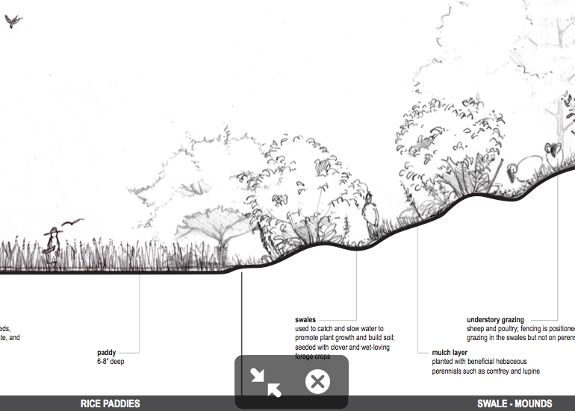
Whole Systems Research Farm
Ben Falk's book
details his experiments at Whole Systems Research Farm, a ten-acre
tract of west-facing hillside on the border of zones 4 and 5 in
Vermont. The land was very run-down when Falk bought it, having been
logged, sugar mapled, pastured, and then clearcut for skiiing, with the
result that most of the soil had eroded away. Although soil maps
showed prime farmland over much of his land, the reality was actually
silty, gravelly clays covered by 0 to 4 inches of topsoil, with bedrock
within two feet of the surface in some places.
While others would have
been daunted by the poor soil, Falk took it as a challenge. He
embarked on ten years of experimentation, with the help of interns,
PDC groups and other visitors, and some hired summer help. The
result is six acres of silvopasture (perennial crops and grazing area
combined), along with rice paddies, vegetable
gardens, and some wild woodland.
One of the things I like most about Falk's writing is that he was inspired
by permaculture theory, but is a realist. He's found that, on the
ground, many of those theories don't hold water once you go beyond the
backyard scale, and he writes about how he tweaked various theoretical
systems to make them work on his farm. He also warns that,
although you can see inklings of how your experiments will turn out by
year five, you really need to wait at least one decade (or, better yet,
two) before declaring any system a success or failure.
My next few posts will delve deeper into Falk's systems, but I want to
end this installment with two words of wisdom I couldn't fit in anywhere else:
- If you have a big homestead, put a specimen of each crop in zone 1
as a barometer so you know when to harvest and when problems appear on the more far-flung crops.
- A great way to activate biochar is to toss it into your composting toilet.
Intrigued? Stay tuned to the blog for tomorrow's post to read more.
Don't have time to improve ten acres? Weekend Homesteader helps you focus on the most important (and easiest) projects to start where you're at.
| This post is part of our The Resilient Farm and Homestead lunchtime series.
Read all of the entries: |
Want more in-depth information? Browse through our books.
Or explore more posts by date or by subject.
About us: Anna Hess and Mark Hamilton spent over a decade living self-sufficiently in the mountains of Virginia before moving north to start over from scratch in the foothills of Ohio. They've experimented with permaculture, no-till gardening, trailersteading, home-based microbusinesses and much more, writing about their adventures in both blogs and books.
Want to be notified when new comments are posted on this page? Click on the RSS button after you add a comment to subscribe to the comment feed, or simply check the box beside "email replies to me" while writing your comment.


A brilliant suggestion to include specimens of further zones in zone 1 !!!!!!
I learn so much from you! Thanks yet again, peace, Terry